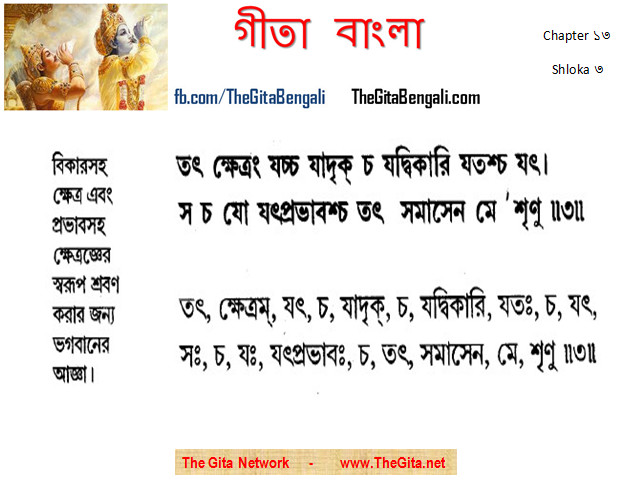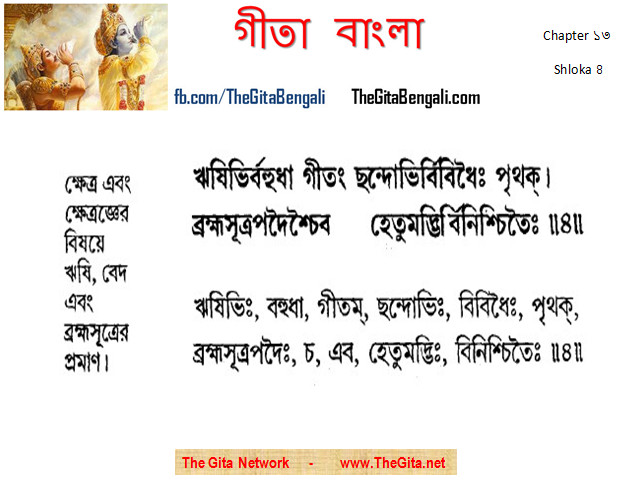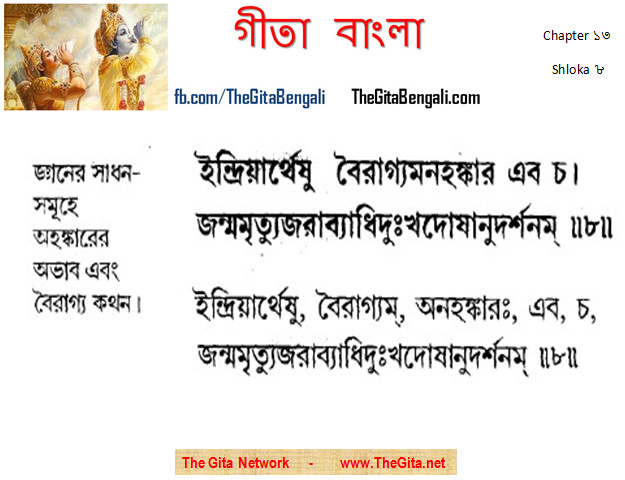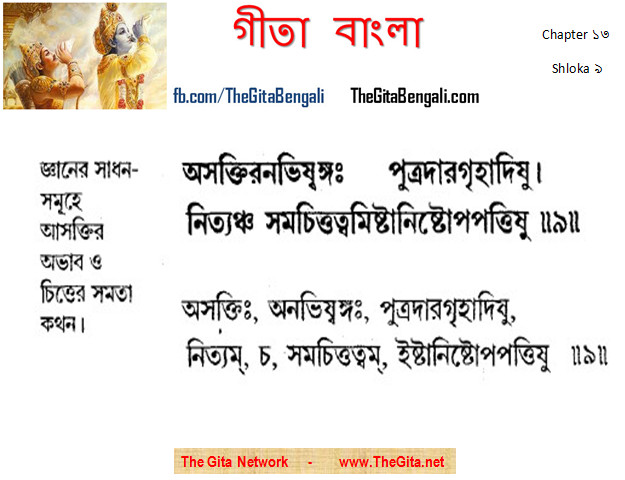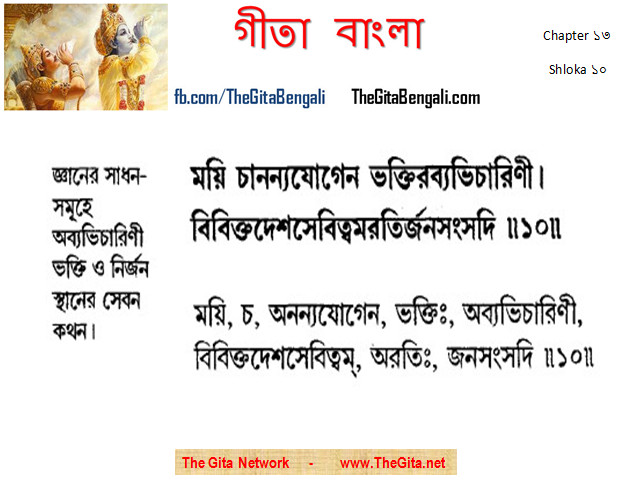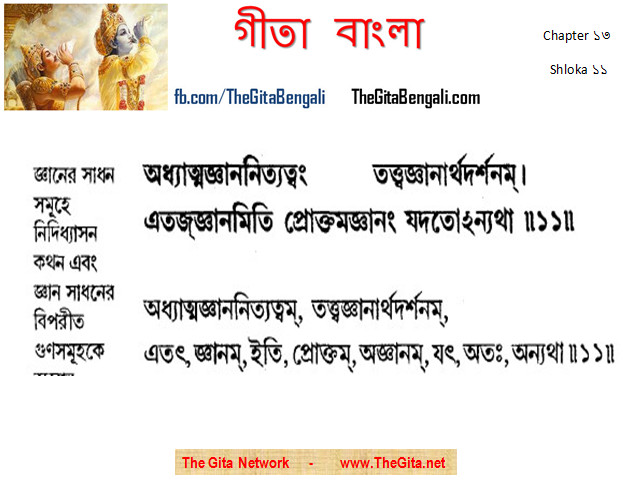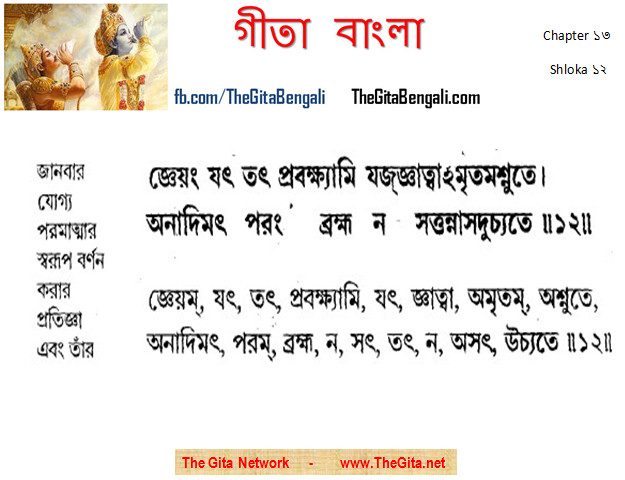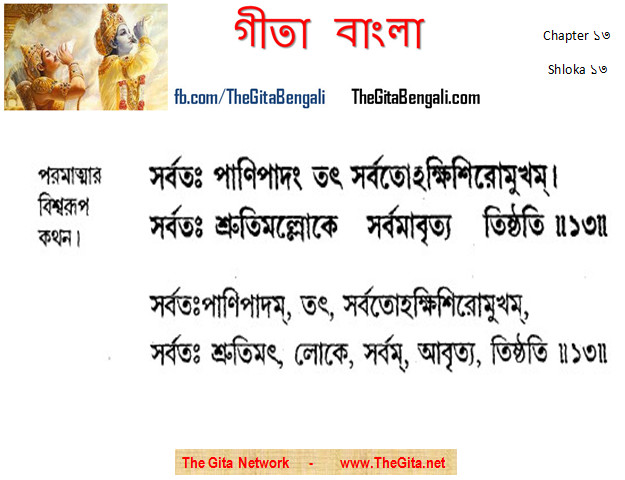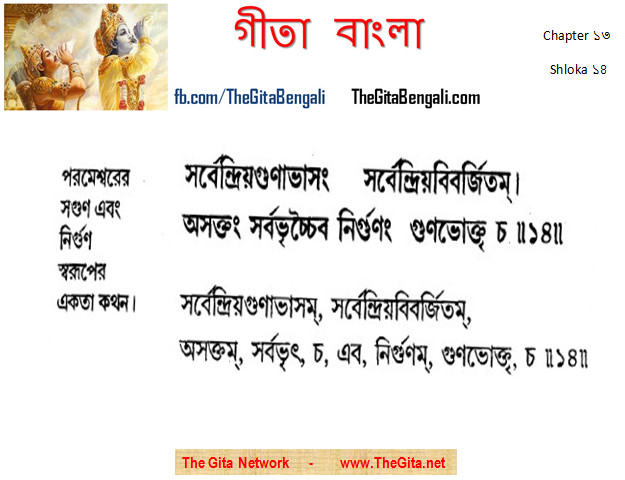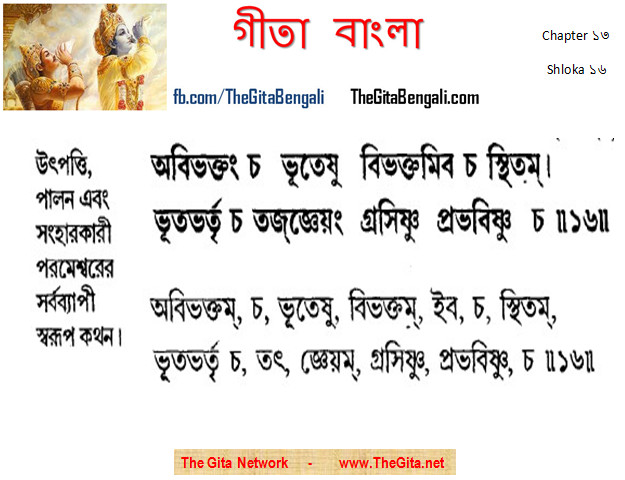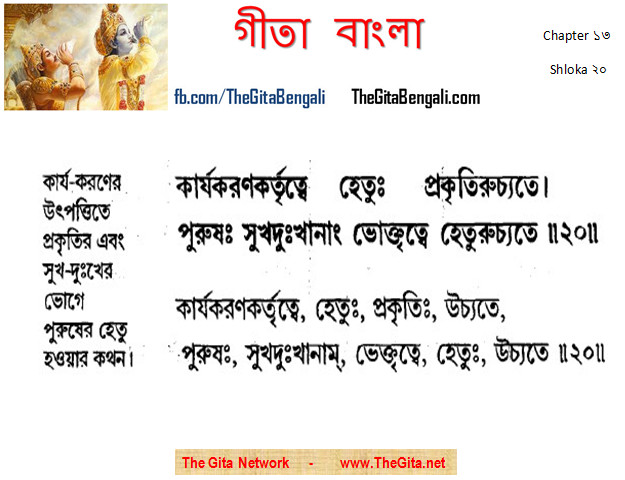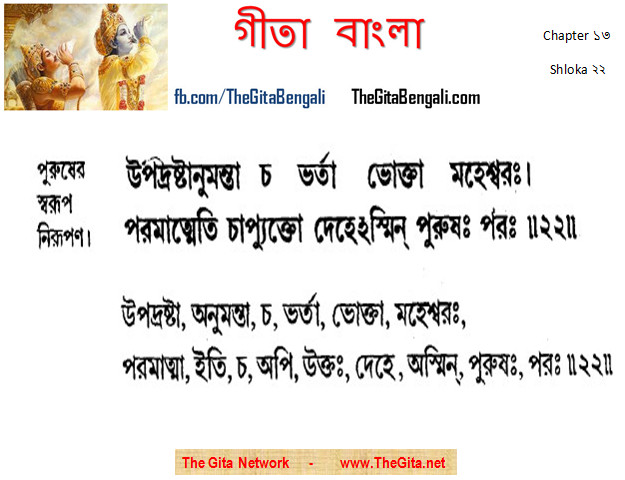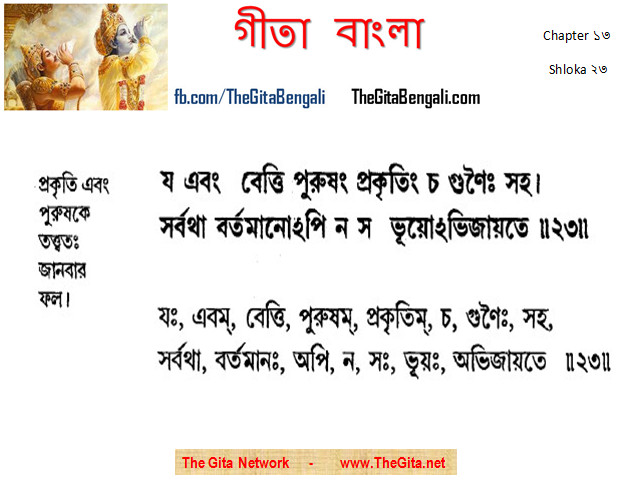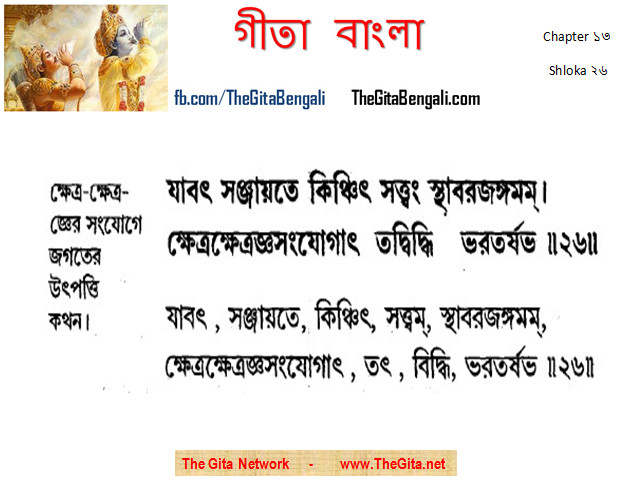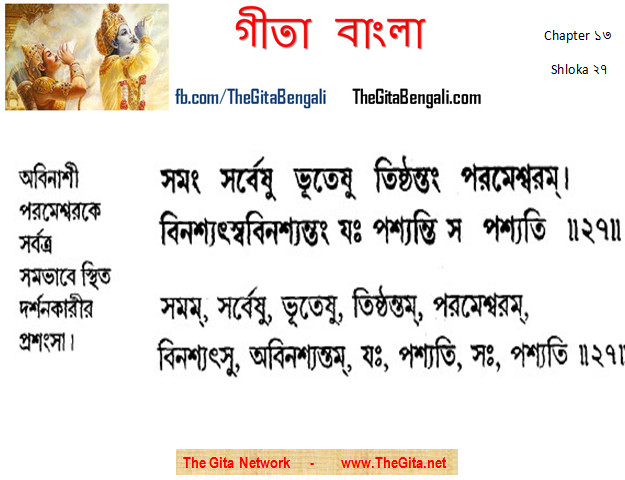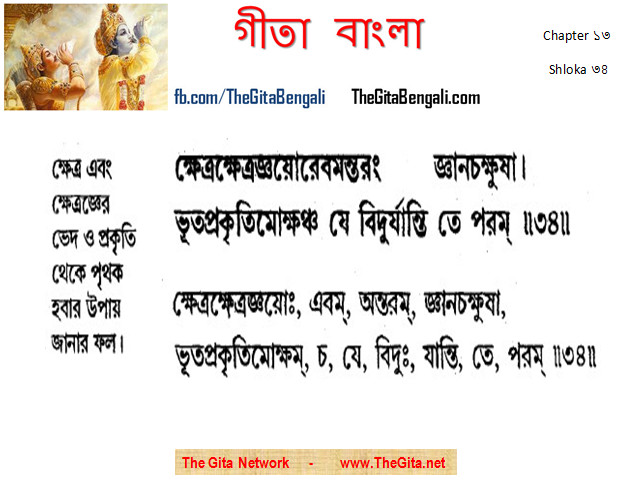The Gita Bengali – অধ্যায় – 13 (Complete)
অধ্যায় – 13 – শ্লোক – 1
The Blessed Lord said:
This body, O Arjuna, is called Kshetra (the field); he who knows it is called Kshetragya (the knower of the field) by the sages (those who have acquired spiritual knowledge).
श्रीभगवान् बोले —–हे अर्जुन ! यह शरीर ‘क्षेत्र’ इस नाम से कहा जाता है और इस को जो जानता है, उसको ‘क्षेत्रज्ञ’ इस नाम से उनके तत्व को जानने वाले ज्ञानी जन कहते हैं ।। १ ।।
অধ্যায় – 13 – শ্লোক – 2
And you should know Me as the knower of the field in all fields, O Arjuna. The knowledge of both the field and the knower of the field is considered by Me to be real knowledge.
हे अर्जुन ! तू सब क्षेत्रों में क्षेत्रज्ञ अर्थात् जीवात्मा भी मुझे ही जान और क्षेत्र-क्षेत्रज्ञ का अर्थात् विकार सहित प्रकृति का और पुरुष का जो तत्व से जानना है, वह ज्ञान है —–ऐसा मेरा मत है ।। २ ।।
অধ্যায় – 13 – শ্লোক – 3
What the field is, what it is like, what is its nature, what are its properties and modifications, from what causes, and also, who He (the knower of the field) is, and what His powers are; hear briefly all that from Me.
यह क्षेत्र जो और जैसा है तथा जिन विकारों वाला है, और जिस कारण से जो हुआ है तथा क्षेत्रज्ञ भी जो और जिस प्रभाव वाला है —-वह सब संक्षेप में मुझसे सुन ।। ३ ।।
অধ্যায় – 13 – শ্লোক – 4
This has been described by the sages in many ways, in various distinctive ways,and also in the suggestive words indicative of the Absolute, full of convincing reasoning.
यह क्षेत्र और क्षेत्रज्ञ का तत्व ऋषियों द्वारा बहुत प्रकार से कहा गया है और विविध वेद मन्त्रों द्वारा भी विभाग पूर्वक कहा गया है तथा भली भाँति निश्चय किये हुए युक्त्ति युक्त्त ब्रह्म सूत्र के पदों द्वारा भी कहा गया है ।। ४ ।।
অধ্যায় – 13 – শ্লোক – 5
The five great elements (earth, water, fire, air and ether), egoism, intellect and also the unmanifested nature (energy of the Lord), the ten senses (ears, skin, eyes, tongue and nose, hands, feet, mouth, anus and the generative organs) and one’s mind and the five objects of the senses (sound, touch, form, taste and smell).
पाँच महाभूत, अहंकार, बुद्भि और मूल प्रकृति भी तथा दस इन्द्रियाँ, एक मन और पांच इन्र्दियों के विषय अर्थात् शब्द, स्पर्श, रूप, रस और गन्ध — ।। ५ ।।
অধ্যায় – 13 – শ্লোক – 6
Desire, hatred, pleasure, pain, the body, intelligence, firmness; these along with their modifications have been called the field (Kshetra).
तथा इच्छा, द्बेष, सुख, दुःख, स्थूल देह का पिण्ड, चेतना और धृति —- इस प्रकार विकारों के सहित यह क्षेत्र संक्षेप में कहा गया है ।। ६।।
অধ্যায় – 13 – শ্লোক – 7
Humility, modesty, non-injury, forgiveness, uprightness, service of the teacher, purity, steadfastness, self-control.
श्रेष्टता के अभिमान का अभाव, दम्भाचरण का अभाव, किसी भी प्राणी को किसी भी प्रकार न सताना, क्षमाभाव, मन-वाणी आदि की सरलता, श्रद्बा भक्त्ति सहित, गुरु की सेवा, बाहर-भीतर की शुद्भि अन्त:करण की स्थिरता और मन इन्द्रियों सहित शरीर का निग्रह ।। ७ ।।
অধ্যায় – 13 – শ্লোক – 8
Indifference to the sense-objects (such as sound, touch, etc.);absence of egoism (e.g. I am superior to all); reflection on the evil in birth, death, old age, sickness and pain.
इस लोक और परलोक के सम्पूर्ण भोगों में आसक्ति का अभाव और अहंकार का भी अभाव, जन्म, मृत्यु, जरा और रोग आदि में दुःख और दोषों का बार-बार विचार करना ।। ८ ।।
অধ্যায় – 13 – শ্লোক – 9
Non-attachment, non-identification of self with son, wife, house, and the rest, and constant even-mindedness on the occurrence of the desirable and undesirable.
पुत्र, स्त्री, घर और धन आदि में आसक्ति का अभाव, ममता का न होना तथा प्रिय और अप्रिय की प्राप्ति में सदा ही चित्त का सम रहना ।। ९ ।।
অধ্যায় – 13 – শ্লোক – 10
Unflinching devotion to Me by the Yoga of non-separation, resort to solitary places, distaste for the society of worldly-minded people.
मुझ परमेश्वर में अनन्य योग के द्वारा अव्यभिचारिणी भक्त्ति तथा एकान्त और शुद्ध देश में रहने का स्वभाव और विषयासक्त्त मनुष्यों के समुदाय में प्रेम का न होना ।। १० ।।
অধ্যায় – 13 – শ্লোক – 11
Constant awareness of the Self (self-knowledge),perception of the end of true knowledge – that is declared to be the true knowledge, and what is opposed to it is ignorance.
अध्यात्म ज्ञान में नित्य स्थिति और तत्व ज्ञान के अर्थ रूप परमात्मा को ही देखना —–यह सब ज्ञान है और जो इससे विपरीत है,वह अज्ञान है —-ऐसा कहा है ।। ११ ।।
অধ্যায় – 13 – শ্লোক – 12
I shall now state that which has to be known, knowing which one attains to immortality; the Supreme Brahman is beginningless and he is called neither ‘Sat’ (being) nor ‘Asat’ (non-being).
जो जानने योग्य है तथा जिसको जानकर मनुष्य परमानन्द को प्राप्त होता है, उसको भली भाँति कहूँगा । वह अनादि वाला परम ब्रह्म न सत् ही कहा जाता है, न असत् ही ।। १२ ।।
অধ্যায় – 13 – শ্লোক – 13
With hands and feet everywhere, with eyes, heads and mouths everywhere, with ears everywhere, He (the knower of the field) exists enveloping all.
वह सब ओर हाथ-पैर वाला, सब ओर नेत्र, सिर और मुख वाला तथा सब ओर कान वाला है । क्योंकि वह संसार में सब को व्याप्त करके स्थित है ।। १३ ।।
অধ্যায় – 13 – শ্লোক – 14
Shining by the functions of all the senses (see previous verses for the names of the senses), yet without the senses (i.e. organs), unattached, yet supporting all. devoid of Gunas (qualities), yet He experiences them.
वह सम्पूर्ण इन्द्रियों के विषयों को जानने वाला है, परन्तु वास्तव में सब इन्द्रियों से रहित है तथा आसक्ति रहित होने पर भी सबका धारण-पोषण करने वाला और निर्गुण होने पर भी गुणों को भोगने वाला है ।। १४ ।।
অধ্যায় – 13 – শ্লোক – 15
He is outside and inside all beings; the unmoving and also the moving ; because of His subtlety (like ether), he is unknowable. He is far and near.
वह चराचर सब भूतों के बाहर-भीतर परिपूर्ण है और चर-अचर रूप भी वही है ; और वह सूक्ष्म होने से अविज्ञेय है तथा अति समीप में और दूर में भी स्थित वही है ।। १५ ।।
অধ্যায় – 13 – শ্লোক – 16
He is undivided and yet he appears to be divided in beings. He supports, swallows up and also creates all beings.
वह परमात्मा विभाग रहित एक रूप से आकाश के सद्र्श परिपूर्ण होने पर भी चराचर सम्पूर्ण भूतों में विभक्त्त सा स्थित प्रतीत होता है ; तथा वह जानने योग्य परमात्मा विष्णु रूप से भूतों को धारण-पोषण करने वाला और रुद्र रूप संहार करने वाला तथा ब्रह्मा रूप से सबको उत्पन्न करने वाला है ।। १६ ।।
অধ্যায় – 13 – শ্লোক – 17
He is light of all lights and is said to be beyond darkness. He is Knowledge, the Knowable (that which has to be known) and the goal of Knowledge, and He is seated in the hearts of all.
वह परब्रह्म ज्योतियों का भी ज्योति एंव माया से अत्यन्त परे कहा जाता है । वह परमात्मा बोध स्वरूप, जानने के योग्य एंव तत्व ज्ञान से प्राप्त करने योग्य है और सबके ह्रदय में विशेष रूप से स्थित है ।। १७ ।।
অধ্যায় – 13 – শ্লোক – 18
Thus the field, knowledge and the knowable have been briefly stated (by Me). My devotee, on knowing this, becomes one with Me.
इस प्रकार क्षेत्र तथा ज्ञान और जानने योग्य परमात्मा का स्वरूप संक्षेप से कहा गया । मेरा भक्त्त इसको तत्व से जानकर मेरे स्वरूप को प्राप्त होता है ।। १८ ।।
অধ্যায় – 13 – শ্লোক – 19
You must know that nature and spirit are both without being, and know also that all modifications and qualities are born of nature.
प्रकृति और पुरुष —इन दोनों को ही तू अनादि जान । और राग-द्बेषादि विकारों को तथा त्रिगुणात्मक सम्पूर्ण पदार्थों को भी प्रकृति से ही उत्पन्न जान ।। १९ ।।
অধ্যায় – 13 – শ্লোক – 20
Both the effect and the cause are generated from nature, and the spirit (soul) is the cause in the experience of pain and pleasure.
कार्य और करण को उत्पन्न करने में हेतु प्रकृति कही जाती है और जीवात्मा सुख-दुःखो के भोक्तापन में अर्थात् भोगने में हेतु कहा जाता है ।। २० ।।
অধ্যায় – 13 – শ্লোক – 21
The spirit (soul) residing in nature experiences the qualities born of nature; this attachment to the qualities is the cause of his birth in pure (good) and impure (evil) wombs.
प्रकृति में स्थित ही पुरुष प्रकृति से उत्पन्न त्रिगुणात्मक पदार्थों को भोगता है और इन गुणों का सडग् ही इस जीवात्मा के अच्छी-बुरी योनियों में जन्म लेने का कारण हैं ।। २१ ।।
অধ্যায় – 13 – শ্লোক – 22
The Supreme Soul in this body is also called the spectator, the permitter, the supporter, the enjoyer, the Great Lord and the Supreme Self (Parmatma).
इस देह में स्थित यह आत्मा वास्तव में परमात्मा ही है । वही साक्षी होने से उपद्रष्टा और यथार्थ सम्मति देने वाला होने से अनुमन्ता, सबका धारण-पोषण करने वाला होने से भर्ता, जीव रूप से भोक्त्ता, ब्रह्मा आदि का भी स्वामी होने से महेश्वर और शुद्ध सच्चिदानन्दधन होने से परमात्मा —-ऐसा कहा गया है ।। २२ ।।
অধ্যায় – 13 – শ্লোক – 23
He who thus knows the Soul and Nature with the qualities, he is never born again regardless of the conditions he lives in.
इस प्रकार पुरुषों को और गुणों के सहित प्रकृति को जो मनुष्य तत्व से जानता है, वह सब प्रकार से कर्तव्य कर्म करता हुआ भी फिर नहीं जन्मता ।। २३ ।।
অধ্যায় – 13 – শ্লোক – 24
Some by Yoga of meditation, behold the Self (supreme) in the self (intellect) by the self (purified mind); others by the Yoga of knowledge, and yet others by the Yoga of action.
उस परमात्मा को तो कितने ही मनुष्य तो शुद्ध हुई सूक्ष्म बुद्भि से ध्यान के द्वारा ह्रदय में देखते है, अन्य कितने ही ज्ञान योग के द्वारा और दूसरे कितने ही कर्मयोग के द्वारा देखते हैं अर्थात् प्राप्त करते हैं ।। २४ ।।
অধ্যায় – 13 – শ্লোক – 25
Those who may not know Me by other means, if worshipping Me as they have heard from others, they too go beyond death by their devotion to what they have heard.
परन्तु इनसे दूसरे, अर्थात् जो मन्द बुद्भि वाले पुरुष हैं ; वे इस प्रकार न जानते हुए दूसरों से अर्थात् तत्व के जानने वाले पुरुषों से सुनकर ही तदनुसार उपासना करते है और वे श्रवण परायण पुरुष भी मृत्यु रूप संसार सागर को नि:संदेह तर जाते हैं ।। २५ ।।
অধ্যায় – 13 – শ্লোক – 26
Whatever is born, unmoving or moving, O Arjuna, know it to be from the union of the field and its knower.
हे अर्जुन ! यावन्मात्र जितने भी स्थावर-जंगम प्राणी उत्पन्न होते हैं, उन सबको तू क्षेत्र और क्षेत्रज्ञ के संयोग से ही उत्पन्न जान ।। २६ ।।
অধ্যায় – 13 – শ্লোক – 27
He who beholds the imperishable Supreme Lord, existing equally in all perishable beings, realizes the truth.
जो पुरुष नष्ट होते हुए इस चराचर भूतों में परमेश्वर को नाशरहित और समभाव से स्थित देखता हैं, वही यथार्थ देखता हैं ।। २७ ।।
অধ্যায় – 13 – শ্লোক – 28
Because he who sees the same Lord existing everywhere does not destroy the Self by the self (intellect); therefore, he goes to the highest goal (is released from the round of birth and death).
क्योंकि जो पुरुष सब में समभाव से स्थित परमेश्वर को समान देखता हुआ अपने द्वारा अपने को नष्ट नहीं करता, इससे वह परम गति को प्राप्त होता है ।। २८ ।।
অধ্যায় – 13 – শ্লোক – 29
He is the real seer (or sage) who sees that all actions are performed by nature alone, and that the Self (Atman) is actionless.
और जो पुरुष सम्पूर्ण कर्मों को सब प्रकार से प्रकृति के द्वारा ही किये जाते हुए देखता है आत्मा को अकर्ता देखता है, वही यथार्थ देखता है ।। २९ ।।
অধ্যায় – 13 – শ্লোক – 30
When a man realizes that the whole variety of beings are residing in the One, and are an evolution from that One alone, then he becomes Brahman (united with the Supreme).
जिस क्षण यह पुरुष भूतों के पृथक-पृथक भाव को एक परमात्मा में ही स्थित तथा उस परमात्मा से ही सम्पूर्ण भूतों का विस्तार देखता है, उसी क्षण वह सच्चिदानन्दधन ब्रह्म को प्राप्त हो जाता हैं ।। ३० ।।
অধ্যায় – 13 – শ্লোক – 31
The Supreme Self without beginning, without qualities, imperishable, though dwelling in the body, O Arjuna, neither acts nor is attached to any action.
हे अर्जुन ! अनादि होने से और निर्गुण होने से यह अविनाशी परमात्मा शरीर में स्थित होने पर भी वास्तव में न तो कुछ करता है और न लिप्त ही होता है ।। ३१ ।।
অধ্যায় – 13 – শ্লোক – 32
As the all pervading ether (sky) is not affected, by reasons of subtlety, so the Self (soul) seated in the body is not affected.
जिस प्रकार सर्वत्र व्याप्त आकाश सूक्ष्म होने के कारण लिप्त नहीं होता, वैसे ही देह में सर्वत्र स्थित आत्मा निर्गुण होने के कारण देह के गुणों से लिप्त नहीं होता ।। ३२ ।।
অধ্যায় – 13 – শ্লোক – 33
Just as the one sun illuminates the whole world, so also the Lord of the field (Supreme Self) illuminates the whole field, O Arjuna.
हे अर्जुन ! जिस प्रकार एक ही सूर्य इस सम्पूर्ण ब्रह्माण्ड को प्रकाशित करता है, उसी प्रकार एक ही आत्मा सम्पूर्ण क्षेत्र को प्रकाशित करता है ।। ३३ ।।
অধ্যায় – 13 – শ্লোক – 34
They who know through the eye of intuition, this distinction between the field and its knower and also perceive the liberation from the Nature of being, go to the Supreme.
इस प्रकार क्षेत्र और क्षेत्रज्ञ के भेद को कार्य सहित तथा प्रकृति से मुक्त्त होने को जो पुरुष ज्ञान नेत्रों द्वारा तत्व से जानते हैं, वे महात्मा जन परम ब्रह्म परमात्मा को प्राप्त होते हैं ।। ३४ ।।


